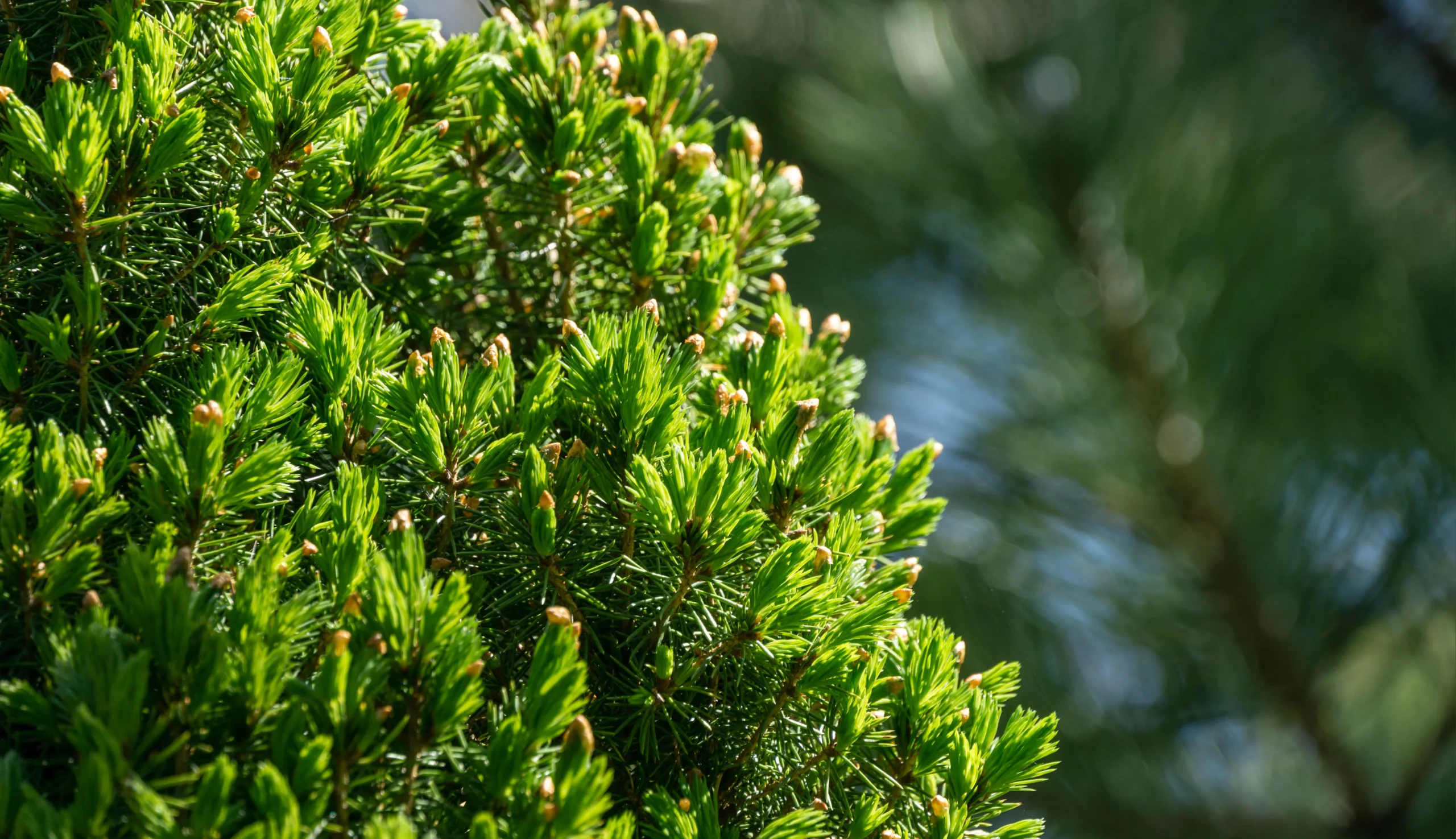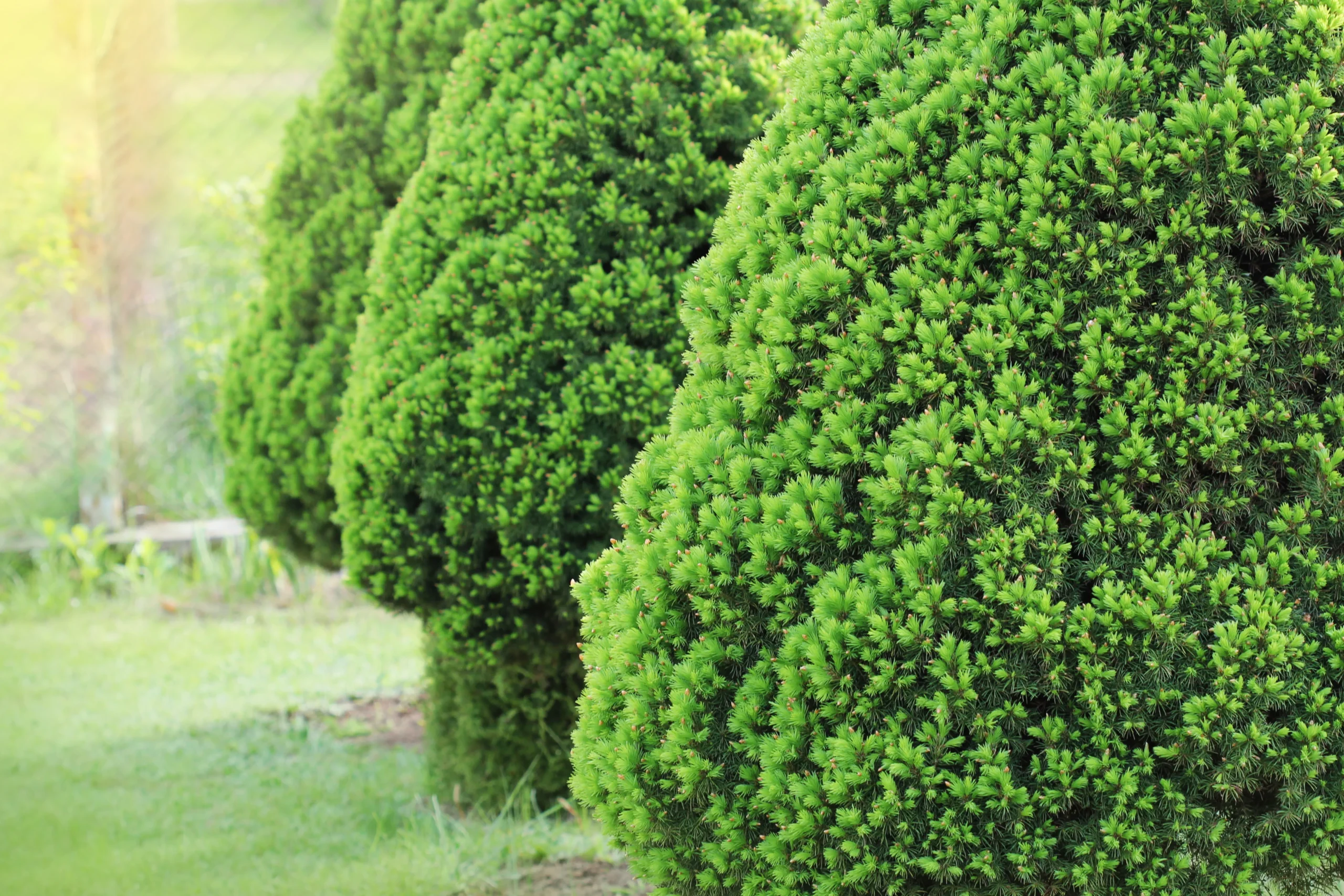Family: Spruce
Type: Shrub

Picea Glauca ‘Conica’, commonly known as Dwarf Alberta Spruce, is a popular evergreen conifer renowned for its distinctive cone-shaped form. This slow-growing dwarf tree has dense, soft, needle-like leaves and maintains a compact size, making it ideal for small gardens and spaces. Its symmetrical shape and lush green foliage make it a favorite among garden enthusiasts.
This dwarf spruce reaches a mature height of about 6-8 feet over many years, with a narrow spread of 2-3 feet. Its slow growth rate and manageable size make it an excellent choice for gardens where space is limited. Dwarf Alberta Spruce is perfect for adding structure and year-round interest to the landscape.
Hardy and adaptable, Dwarf Alberta Spruce thrives in a range of conditions but prefers full sun and well-drained soil. Its resilience to cold climates and minimal maintenance requirements make it a practical and attractive choice for a variety of garden styles.
Hardiness Zone: 4a-3a
Pet Friendly: Yes
Moisture Preference: Average to moist
Sun Needs: Full sun to partial shade
Growth Rate: Slow
Average Height (feet): 6
Average Spread (feet): 5
Average Life Span (years): 50
Form: Pyramidal
Foliage Color: Green
Foliage Shape: Needle
Bark Color: Gray
Bark Texture: Smooth
Dwarf Alberta Spruce is ideal for creating focal points in the landscape. Its unique shape and compact size make it a standout in garden beds, borders, or as a specimen plant. Use it as an anchor plant in a small garden or as part of a larger landscape design.
This dwarf spruce works well in rock gardens, adding height and texture. Its formal appearance is also perfect for framing entryways or paths. Plant it in pairs for symmetrical compositions or as a solitary feature for a minimalist look.
Incorporate Dwarf Alberta Spruce into mixed borders or foundation plantings. It pairs beautifully with flowering plants and other shrubs, providing contrast and a steady green backdrop.

In formal gardens, Dwarf Alberta Spruce adds elegance and symmetry. Its conical shape is ideal for creating a formal, structured look.
For Japanese gardens, this spruce enhances the serene and natural aesthetic. Its slow growth and evergreen nature embody the tranquility often sought in these garden designs.
Dwarf Alberta Spruce is also well-suited for container gardening. Its small size and slow growth make it an excellent choice for pots, where it can live for several years with proper care.
Use Dwarf Alberta Spruce in miniature or fairy gardens. Its compact form and slow growth make it perfect for these whimsical, small-scale landscapes. Combine it with low-growing ground covers and miniature accessories.
Select our pre-made garden layouts to create a landscape that’s uniquely yours. Simple, smart, and customizable!
In spring, Dwarf Alberta Spruce maintains its bright green, fresh appearance. New growth adds to its dense, lush foliage.
During summer, the spruce continues to display vibrant green foliage. It stands resiliently through the heat, providing a steadfast green presence.
In the fall, while other plants begin to change color and lose leaves, Dwarf Alberta Spruce remains unchanged, offering consistency in the garden's color palette.
Winter highlights the structural beauty of Dwarf Alberta Spruce. Its evergreen foliage and cone-shaped form stand out against snowy landscapes, providing visual interest during the colder months.
Dwarf Alberta Spruce thrives in areas with full sun to light shade. It’s ideal for small yards, rock gardens, or as a feature plant in mixed borders, where its unique form can be fully appreciated.
Full sun is optimal for Dwarf Alberta Spruce, promoting dense foliage and a symmetrical shape. However, it can tolerate light shade, where it may grow slightly less densely.
This spruce prefers well-drained soil with a slightly acidic to neutral pH. It's adaptable to various soil types, as long as the site avoids waterlogging.
Space Dwarf Alberta Spruce about 3-4 feet apart from other plants. This allows each tree room to grow without overcrowding and ensures good air circulation.
The best time to plant Dwarf Alberta Spruce is in the spring or early fall. These seasons allow the plant to establish roots in moderate temperatures.
Plant at the same depth as it was in the container. Loosen the soil around the planting area to encourage root growth. Water well after planting to settle the soil.
Water regularly during the first year after planting. Once established, Dwarf Alberta Spruce is relatively drought-tolerant but benefits from occasional watering during dry periods.
Fertilize in early spring with a slow-release, balanced fertilizer. This provides nutrients for growth without encouraging excessive foliage production.
Pruning is generally not necessary, as Dwarf Alberta Spruce naturally maintains its shape. If desired, lightly prune to shape in late winter or early spring.
In spring, check for any winter damage and prune as needed. Apply fertilizer to support new growth.
During summer, ensure the plant is watered during extended dry periods to maintain health and appearance.
In fall, no specific care is necessary. The plant will naturally prepare for dormancy.
Winter care is minimal. Dwarf Alberta Spruce is cold-hardy and requires no additional protection.
Dwarf Alberta Spruce has a slow growth rate, typically only growing a few inches per year.
Yes, Dwarf Alberta Spruce is generally considered deer resistant. Its dense foliage and needle-like leaves are not favored by deer.
Yes, due to its compact size and slow growth, Dwarf Alberta Spruce is an excellent choice for container gardening. This is ideal for patios, balconies, or limited space areas.
Sign up below to get exclusive deals, discounts, and new plant collections—delivered straight to your inbox! Plus, stay inspired with the latest gardening tips, landscaping trends, and DIY garden ideas. Start growing with us today!
A big thank you for subscribing to the PBN Design newsletter.
We're thrilled to have you join our community. Get ready for exciting updates, insightful content, and more delivered straight to your inbox.
Stay tuned!
Go backA big thank you for subscribing to the PBN Design newsletter.
We're thrilled to have you join our community. Get ready for exciting updates, insightful content, and more delivered straight to your inbox.
Stay tuned!
Go back